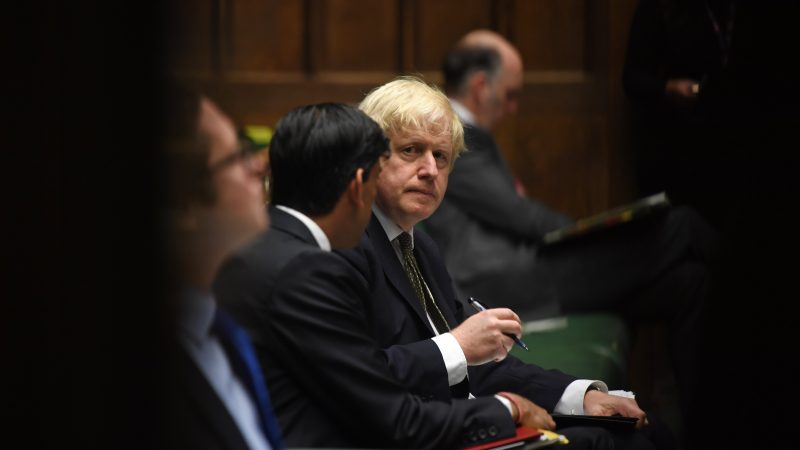
A few weeks ago, when I was out on the doorstep in Birmingham Erdington with a group of MPs, councillors, activists and party staff, a man stopped us on the street and began to yell that we were campaigning for a party led by a man who had let Savile rape children. This was not something that had happened to me before; this is not something that happened in isolation from broader political events.
During Prime Minister’s Questions in January, Boris Johnson alleged that Keir Starmer, during his time as director of public prosecutions, had failed to prosecute Jimmy Savile. Savile, a fixture of British light entertainment through the late 20th century, was revealed after his death to have been a violent and extraordinarily prolific paedophile.
Someone possessed of only the basic facts of the PMQs exchange could perhaps draw the charitable conclusion that the Prime Minister was attacking the leader of the opposition for legitimate failures that took place on his watch in his previous role. This is not the case: it is not simply that this is a false or uncharitable reading, or even that it was the cheap shot of a scandal mired Prime Minister fighting for his political life. The Savile comments should be understood as the mainstreaming of a far-right conspiracy theory by the man who runs the country.
Speaking on the Savile comments, online extremism researcher Dr Annie Kelly noted that “British conspiracy theorist networks have circulated the rumour that Starmer was implicated in the cover-up of Savile’s crimes for years now”, and that they “were delighted to see that a meme of theirs had made it to the halls of parliament”.
Even conspiracy theories that seem laughable or harmless often have something nasty and pernicious at their cores, but there are limits to the dangers that, say, flat eartherism presents to our public square. The Jimmy Savile theory, however, does not have such limits. Online extremism expert Dr Tim Squirrell, of the Institute for Strategic Dialogue think tank, is clear on the reasons why the Savile theory is particularly noxious. He says: “It represents the mainstreaming of a conspiracy theory most closely associated with far-right movements who have weaponised the idea they are fighting for the rights of children, often with explicitly Islamophobic narratives, but also with a broader anti-establishment narrative of institutional negligence (or worse, complicity) on child abuse.”
People will do appalling and violent things if they believe they are protecting children. This is the danger of theories such as pizzagate and QAnon, which focus on the actions of shadowy elites harming children, but it has a long historical precedent. In the 12th and 13th centuries, the murders of children like William of Norwich and Hugh of Lincoln were blamed on local Jewish communities, often amid allegations of blood libel (that is, use of children’s blood in religious rituals). The prevalence of belief in these canards was a key factor leading to the expulsion of Jews from England in 1290, and we see the basic shape of these allegations in many contemporary conspiracy theories.
Much of QAnon fixates on the idea of elite paedophiles, who are allegedly extracting a life-enhancing chemical (“adrenochrome”) from their child victims. Conspiracy theories about elite paedophiles sail close to the wind of blood libel, and Dr Annie Kelly notes that enthusiasm for this theory was particularly pronounced in British QAnon circles. With cases like those of Jimmy Savile or the billionaire Jeffrey Epstein, genuine issues of institutional complicity in abuse provide rich ground for extreme, fascistic, antisemitic and violent stories, which spread and mutate quickly online.
Failure to grasp the material realities and consequences of the online world is common in politicians of all persuasions. Ignorance, however, is no excuse when trafficking in such deeply harmful false narratives. David Cameron, in his characteristic stupid-man’s-impression-of-a-thinking-man rhetorical style reportedly commented that in holding a referendum on EU membership “you might unleash demons of which ye know not”. The Prime Minister legitimising this conspiracy theory might be similarly described, and its impacts will be far-reaching. Attempts to understand it through opinion polling or how it plays with the pundit class misunderstand the potency, and the malice, of the thing itself.
Just a few days after the Prime Minister’s comments, Keir Starmer was mobbed outside of parliament by a group shouting, among other things, “paedophile protector”. The Labour leader – a man famous for choosing his words with lawyerly precision – was unusually strong in his subsequent denunciation of Johnson. He said: “The PM knew exactly what he was doing. It is a conspiracy theory of violent fascists that has been doing the rounds for some time.”
Two MPs have been murdered in the last six years, and anyone working for politicians – particularly those who are BME, LGBT or women – can attest to the volume of threatening and abusive material that they receive. However, the Savile theory’s impacts will not fall only on politicians. “My first concern when seeing the clip of Johnson bringing up Savile was that it would result in serious violence against Labour canvassers,” says Kelly. “It would follow current trends – in the 2019 election campaign we saw several Labour canvassers physically attacked by people using common derogatory language of the far right for the left, like ‘traitors’ or ‘Marxists’.”
My own experience on the doorstep would seem to bear out the idea that the Savile theory is something that canvassers will face on the doorstep as we move into the short campaign for May’s local elections. To myself and others, this is a genuinely alarming prospect, and one for which we have our Prime Minister to thank.




More from LabourList
Government abandons plans to delay 30 local elections in England
‘The cost of living crisis is still Britain’s defining political challenge’
‘Nurses are finally getting the recognition they deserve’